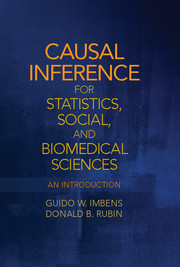Book contents
- Frontmatter
- Dedication
- Contents
- Preface
- PART I INTRODUCTION
- PART II CLASSICAL RANDOMIZED EXPERIMENTS
- PART III REGULAR ASSIGNMENT MECHANISMS: DESIGN
- PART IV REGULAR ASSIGNMENT MECHANISMS: ANALYSIS
- 17 Subclassification on the Propensity Score
- 18 Matching Estimators
- 19 A General Method for Estimating Sampling Variances for Standard Estimators for Average Causal Effects
- 20 Inference for General Causal Estimands
- PART V PRGULAR ASSIGNMENT MECHANISMS:SUPPLEMENTARY ANALYSES
- PART VI REGULAR ASSIGNMENT MECHANISMS WITH NONCOMPLIANCE: ANALYSIS
- PART VII CONCLUSION
- References
- Author Index
- Subject Index
18 - Matching Estimators
from PART IV - REGULAR ASSIGNMENT MECHANISMS: ANALYSIS
Published online by Cambridge University Press: 05 May 2015
- Frontmatter
- Dedication
- Contents
- Preface
- PART I INTRODUCTION
- PART II CLASSICAL RANDOMIZED EXPERIMENTS
- PART III REGULAR ASSIGNMENT MECHANISMS: DESIGN
- PART IV REGULAR ASSIGNMENT MECHANISMS: ANALYSIS
- 17 Subclassification on the Propensity Score
- 18 Matching Estimators
- 19 A General Method for Estimating Sampling Variances for Standard Estimators for Average Causal Effects
- 20 Inference for General Causal Estimands
- PART V PRGULAR ASSIGNMENT MECHANISMS:SUPPLEMENTARY ANALYSES
- PART VI REGULAR ASSIGNMENT MECHANISMS WITH NONCOMPLIANCE: ANALYSIS
- PART VII CONCLUSION
- References
- Author Index
- Subject Index
Summary
INTRODUCTION
Following the discussion of subclassification (i.e., blocking, or stratification) in the previous chapter, we discuss in this chapter a second general approach to estimation of treatment effects in regular designs, namely matching. As earlier, we mainly focus on average effects, although the methods readily extend to estimating other causal estimands, for example, the difference in the median or other quantiles by treatment status, or differences in variances. Many of the specific techniques in this chapter are similar to the methods discussed in Chapter 15, but the aim is different. In Chapter 15 we were interested in constructing a sample with improved balance in the covariates. Here we take the sample as given, and focus on estimating treatment effects. In this chapter we consider both methods where only the treated units are matched (and where the focus is on the effects of the treatment for the treated), and methods are matched in order to estimate the effects of the treatment for the full sample.
Matching estimators – based on direct comparisons of outcomes for observationally equivalent “matched” units that received different levels of a treatment – are among the most intuitive estimators for treatment effects. Informal assessments of causality often rely implicitly on matching: “This unemployed individual found a job because of the skills acquired in a job-training program.” Typically the case for or against such a claim is made by a comparison to an individual who did not participate in the training program but who is similar with respect to observed background characteristics. If we maintain the unconfoundedness assumption – that the probability of receipt of treatment is free of dependence on the potential outcomes, once observed pre-treatment characteristics are held constant – such comparisons between treated and control units with the same covariate values have a causal interpretation. The matching approach estimates average treatment effects by pairing such similar units and averaging the within-pair differences in observed outcomes.
Information
- Type
- Chapter
- Information
- Causal Inference for Statistics, Social, and Biomedical SciencesAn Introduction, pp. 401 - 432Publisher: Cambridge University PressPrint publication year: 2015
